- Home
- V. S. Naipaul
A Turn in the South
A Turn in the South Read online
V. S. Naipaul
A TURN IN THE SOUTH
V. S. Naipaul was born in Trinidad in 1932. He went to England on a scholarship in 1950. After four years at Oxford he began to write, and since then he has followed no other profession. He is the author of more than twenty books of fiction and nonfiction and the recipient of numerous honors, including the Nobel Prize in 2001, the Booker Prize in 1971, and a knighthood for services to literature in 1990. He lives in Wiltshire, England.
BOOKS BY V. S. NAIPAUL
NONFICTION
The Writer and the World
Between Father and Son: Family Letters
Beyond Belief: Islamic Excursions Among the Converted Peoples
India: A Million Mutinies Now
A Turn in the South
Finding the Center
Among the Believers
The Return of Eva Perón (with The Killings in Trinidad)
India: A Wounded Civilization
The Overcrowded Barracoon
The Loss of El Dorado
An Area of Darkness
The Middle Passage
FICTION
Half a Life
A Way in the World
The Enigma of Arrival
A Bend in the River
Guerrillas
In a Free State
A Flag on the Island*
The Mimic Men
Mr. Stone and the Knights Companion*
Miguel Street
A House for Mr. Biswas
The Suffrage of Elvira*
The Mystic Masseur
*Published in an omnibus edition
entitled The Nightwatchman’s Occurrence Book
FIRST VINTAGE INTERNATIONAL EDITION, FEBRUARY 1990
Copyright © 1989 by V. S. Naipaul
All rights reserved under International and Pan-American Copyright Conventions. Published in the United States by Vintage Books, a division of Random House, Inc., New York. Originally published, in hardcover, by Alfred A. Knopf, Inc., New York, in 1989.
Library of Congress Cataloging-in-Publication Data
Naipaul, V. S. (Vidiadhar Surajprasad), 1932–
A turn in the South / V. S. Naipaul. —1st Vintage international ed.
p. cm. —(Vintage international)
“A portion of this work was originally published in the New Yorker”—T.p. verso.
eISBN: 978-0-307-78928-0
1. Southern States—Civilization—20th century. 2. Southern States—Social life and customs—1865– 3. Naipaul, V. S. (Vidiadhar Surajprasad), 1932– —Journeys—Southern States. I. Title.
[F216.2.N35 1990]
975—dc20 89-40108
A portion of this work was originally published in The New Yorker.
Grateful acknowledgment is made to the following for permission to reprint previously published material:
Louisiana State University Press: Selections from the poetry of James Applewhite. Reprinted by permission.
The Songwriter Guild of America: Excerpt from “Late in the Day” by Timothy O’Brien. Copyright © 1987 by Pinspotter Music, Inc. Pursuant to secitons 304(c) and 401(b) of the U.S. Copyright Act. All rights administered by The Songwriters Guild of America.
Warner/Chappell Music Inc.: Excerpt from “Eighteen Wheels and a Dozen Roses” by Gene Nelson and Paul Nelson. Copyright © 1988 by Warner-Tamerlane Publishing Corp., Believus or Not Music, Screen Gems-EMI Music. All rights reserved. Used by permission.
Polygram International Publishing Companies: Excerpt from “Good Ole’ Boys Like Me” by Bob McDill. Copyright © 1979 by Polygram International Publishing, Inc. International copyright secured. All rights reserved. Used by permission.
v3.1
There is a history in all men’s lives
Figuring the natures of the times deceased.
SEEPERSAD NAIPAUL
14 April 1906
3 October 1953
In ever renewed homage
CONTENTS
Cover
About the Author
Other Books by This Author
Title Page
Copyright
Epigraph
Dedication
Prologue
DOWN HOME: A LANDSCAPE OF SMALL RUINS
1
ATLANTA: TUNING IN
2
CHARLESTON: THE RELIGION OF THE PAST
3
TALLAHASSEE:
THE TRUCE WITH IRRATIONALITY I
4
TUSKEGEE:
THE TRUCE WITH IRRATIONALITY II
5
JACKSON, MISSISSIPPI:
THE FRONTIER, THE HEARTLAND
6
NASHVILLE: SANCTITIES
7
CHAPEL HILL: SMOKE
PROLOGUE
Down Home: A Landscape of Small Ruins
JIMMY WORKED in New York as a designer and lettering artist. Howard was his assistant. Jimmy, who could become depressed at times, said to Howard one day, “Howard, if I had to give up, and you couldn’t get another job, what would you do?” Howard, who was from the South, said, “I would go home to my mama.”
Jimmy was as struck by this as I was when Jimmy told me: that Howard had something neither Jimmy nor I had, a patch of the earth he thought of as home, absolutely his. And that was where—many months after I had heard this story—I thought I should begin this book about the South: with the home that Howard had.
Howard arranged the visit. Jimmy decided to come with us. We went on the Easter weekend; the timing was pure chance.
It was raining, had been raining in New York for two days.
At La Guardia Howard said, “I hated the place when I was young, for the continuity.”
I thought he meant historical continuity, the past living on. But from other things he then said, I felt he meant only that it was a country place where little changed and little happened. I had this trouble with Howard’s words sometimes; I was too ready to find in them meanings he didn’t intend.
Howard was six feet tall, but slender and light of movement. He was in his late twenties or early thirties. He was very much his own man. He lived alone, and he preferred not to live in Harlem. He was a serious reader of newspapers and magazines, and he had a special interest in foreign affairs. He liked to cook; and he kept himself fit by playing paddle ball on weekends. He was easy to be with, not spiky; and I put this down in part to the home he was so sure of and still close to.
Howard said, “You see how the South begins. More black people here, on the plane.”
Most of the passengers were black, and they were not like an African or West Indian crowd. They were almost subdued, going home from the big city for Easter.
We landed at Greensboro. It was a big airport; and then, just a few minutes away, proof of the scale of things here, there was another airport, just as big. We got off there. There were military people in the waiting areas. It was warmer than in New York; I changed into a lighter jacket.
Soon we were on the highway.
Howard said, “Look, the dogwood and the pines. It is what you see a lot of in the South.”
The dogwood was a small tree, and it was now in single-petaled white blossom. Not the dogwood of England, the water-loving red-stemmed shrub or small tree that made a bright autumn and winter show. And there were—Howard identified them for me—oaks and maples, in the freshest spring-green.
The land was flat, like the pampas of Argentina or the llanos of Venezuela. But trees bordered the fields and gave a human scale to things. We passed tobacco barns, tallish, squarish, corrugated-iron structures, where in the old days tobacco was cured. They were in decay, the corrugated iron rusted dark red, the wood weathered gray. Against the green this corrugated-iron rust was a lovel
y color; it gave an extra beauty to the land.
The highway looked like highways everywhere else in the United States: boards for motels and restaurants and gas stations.
Tobacco was still a crop. We saw the seedlings being mechanically planted: one black man on the tractor, two men on the trolley behind dropping earth-rooted seedlings down a shafted dibble. All this used to be done by hand, Howard said. He picked tobacco in the school holidays. The resin from the green leaf stained his hands black and was hard to clean off. I never knew about this black-staining resin from the green leaf, but it was immediately comprehensible. It was for that resin, that tar, that people smoked the cured leaf.
We had driven so fast on the highway that we were in Howard’s area almost before I was ready for it. There was a small town center, a small rich white suburb attached to that town, and then outside that a black area. The differences were noticeable. But Howard, near his home now, appeared to claim both the white area and the black area.
He had been excited all morning; he was more excited now. And then, entering another little town, we were seeing the places he had known as a boy. He had cut the grass and cleaned the swimming pool and mopped the porch of that house, the Bowen house, the house of the people who still more or less owned the little town that was called Bowen. And he had done the same job for people in that other house.
That little green wooden house, now closed up, just beside the highway, had been his mother’s house. He had grown up there. His mother lived in another house now; another house—bigger and newer—was home. We saw it from the highway. It was a concrete-block house set back from the road, behind some other houses: not the old, tree-embowered house I had had in my imagination. We didn’t stop; we were going first to the motel, which was some way outside the town.
The main building of the motel was a loghouse. In the sandy yard there were subsidiary little barracklike room-rows below trees and behind shrubs. A black boy was hosing down the veranda floor of the loghouse. He looked timid—for the first time that morning I had a feeling of racial constraint—and he said the office was inside.
There was no apparent office. Only an empty low-ceilinged room with two or three close-set rows of little tables with red- or blue-checked tablecloths. The air conditioning had been turned off a long time before, and the air was dead and smelly.
Howard called out, and after some time a young white man in shorts, with a yellow plastic apron and a large kitchen knife, came in from the back, through two doors. He was sallow, open-mouthed, and his movements were uncoordinated. A little while later a fat old white woman with a twisted face came in through the same two doors. I felt we had been wrong to disturb them, the old woman and the young man who was really a boy.
Two rooms? Would we want two double rooms or two single rooms?
I couldn’t understand the old woman’s questions. But then, putting down his knife, the boy with the shorts and the yellow plastic apron half beckoned to us, and we followed him—he walked with stamping, awkward steps—out of the dining room to the sandy yard below the pine trees, and then to a low building at the edge of the yard. The ground there was damp; and the small rooms that the boy opened up, one after the other, had the dampness of the ground, with a shut-in, old smell, and with stained cheap carpets.
Better judgment was at work, however. And even while Jimmy and I were looking at the rooms with the silent boy in the yellow apron, Howard—who had not followed us—had heard from somebody in the motel (perhaps the old woman with the twisted face) that there was a more up-to-date motel in the next town, Peters. (Bowen, Peters: American places, big and small, are often named after people; and the ordinariness of the names can make some itineraries read like the muster of an army squad or a sports team.)
To Peters, then, we went, through the highway landscape. And the Peters motel was an altogether bigger affair, with a number of two-story buildings in red brick. It even advertised a swimming pool (though something had happened to the filter, and the pool was green with algae).
Howard, going up the steps ahead of us and entering the office through the two doors, turned to me and said mysteriously, with a touch of humor, “This is something for you.”
And what he meant by that was that the lady in the office was Indian, unmistakably, Indian from India, though she was not in a sari, and though there was an un-Indian confidence in her voice and manner. Her speech was American—to me. It let her down only once, when she said, in her brisk, undeferential way, that coffee and things like that were not available on the “pre-mises,” making the word rhyme with “vices.” That was Indian; that had a flavor of India.
I heard later from Howard that in the last six years or so Indians from India had been buying the motels in the South from white people. (And this perhaps explained the big neon sign, AMERICAN OWNED, that I saw some time later on a motel in northwestern Georgia.)
So there, in the place that was home to Howard: the white folk, who might have come out of a novel; and, not far away, people from the other side of the world who were already making themselves American, according to the special idea they would have had of the word.
The motel lady’s husband came into the office. He too was Indian.
He wore a short-sleeved fawn-colored velour shirt, and he had a Texas accent—or so it seemed to me. His wife had said (and he now confirmed) that he had been in the oil business, as a petroleum engineer, in Houston. He had left oil and Houston six years before; and he thought (as his wife had said earlier, though admitting that Peters, North Carolina, was a very quiet place) he had made a good decision.
HETTY’S HOUSE, Howard’s new home, had been built in parts by Hetty herself, with her own hands. It was set back from the road, behind other houses in the settlement, and a drive led to it from the highway. The site had been well chosen. The house had a front portico with steps on either side, and a porch-garage at the end of the drive from the highway. At the back of the house was woodland.
The fluffy, carpeted, upholstered sitting room was welcoming. In one corner was the kitchen, with a dining or serving counter. The bedrooms and general rooms were on either side of a central corridor that ran off from the sitting room.
Hetty was a big but shapely woman. She was sixty, but her skin was still good. She wore glasses. She made a great deal of friendly noise welcoming Jimmy, whom she knew; and Howard acted out the role of the son returning home. He sat on a high stool in front of the kitchen counter, relaxed, his limbs elegantly arranged, one leg folded, one leg straight: in this house a son and now, in addition, half our host. On the wall beside the door that led to the porch-garage there were family photographs, including one of Howard in a graduation gown.
We had lunch: fried fish, collard greens, sweet potatoes with the color of boiled carrots. Four of us sat at the dining table in the dining part of the front reception room.
While we were sitting—I with my back to the front door, which opened out onto the portico with the steps on either side—there were great shouts. A party had arrived: Hetty’s sister from Augusta, Dee-Anna (as I heard the name), and Dee-Anna’s husband and son. Dee-Anna didn’t look like Hetty. She was much bigger and more full of bulges than Hetty, and darker (Hetty was brown). She was more vivacious—acting up a little to her figure—but she had more searching eyes. She didn’t have Hetty’s serenity.
Dee-Anna’s son seemed sloppily dressed at first, but then I saw that his outfit had been assembled with care and was absolutely for show: a slate-blue jacket in the contemporary shapeless style, a shining, textured white shirt, tapered trousers with patches and exposed labels, and new shoes (new from the near-white appearance of the instep). Easter visitors; holiday dressing up.
They talked for a while about a recent big boxing match. They all liked the winner. Howard said he was like a modern black man, smooth and educated; the other fellow was big and strong, but rougher.
The young man with the contemporary clothes asked what I was doing in North Carolina.
And when Howard and I explained, Dee-Anna said, with a knitting of her brows, “I hope you are not going to give us the gloom.”
Her son—his seriousness now seeming quite separate from his clothes—said, “We’ve had too much of the past.” They were not interested in the past; they were interested in the present.
IT HAD not occurred to me to ask whether Hetty did a job. Howard hadn’t told me; and it was only after we had got to the house that I gathered that she worked part-time in the café side of a convenience store that was owned by the present head of the Bowen family. She took Jimmy and me to meet him after lunch. She said he was a good man.
The convenience store was only one of Mr. Bowen’s interests. We went to see him in his furniture factory. He said that he wasn’t really a Bowen. He had only married into the family, but people spoke of him as a Bowen, and he had grown to accept the name. The first record of the name in the town of Bowen was a few years before the Declaration of Independence, but at that time the name of the town was Lawrence (which suggested some kind of dispossession during or after the War of Independence).
History, though, wasn’t what Mr. Bowen wanted to talk about. He was a big man in his early sixties, and he wanted Jimmy and me to see the furniture he made; he wanted to talk about business in Bowen; he wanted us to know that the little town was a go-ahead place, that, though it had only a few thousand people, there were very many millions deposited in the local banks. He was a Bowen man through and through; and while he gave us all the figures, walking Jimmy and me round the furniture factory, showing us the things he or his machines did with veneers, Hetty stood aside, in her full denim skirt, with something of Howard’s elegance in her posture.
Bowen—I had never heard of the name of the place until Howard had told me. And here it was everywhere, attached to every kind of local business, farm equipment and agricultural supplies, general store, video rentals, gas station, furniture, convenience store.

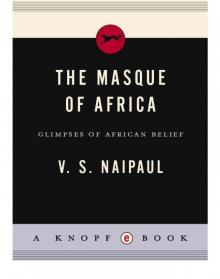 The Masque of Africa: Glimpses of African Belief
The Masque of Africa: Glimpses of African Belief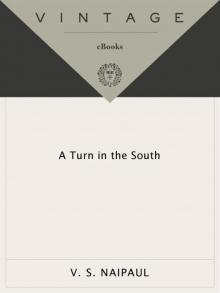 A Turn in the South
A Turn in the South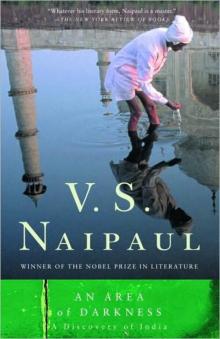 An Area of Darkness
An Area of Darkness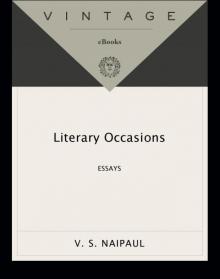 Literary Occasions: Essays
Literary Occasions: Essays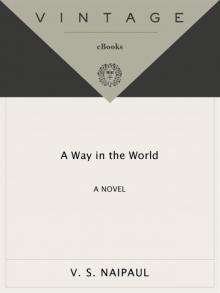 A Way in the World
A Way in the World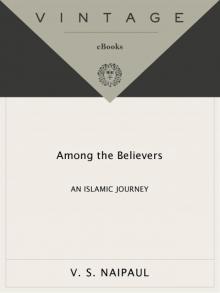 Among the Believers: An Islamic Journey
Among the Believers: An Islamic Journey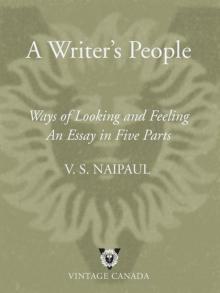 A Writer's People: Ways of Looking and Feeling
A Writer's People: Ways of Looking and Feeling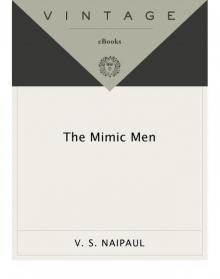 The Mimic Men: A Novel
The Mimic Men: A Novel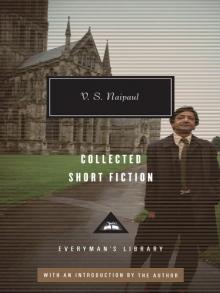 Collected Short Fiction
Collected Short Fiction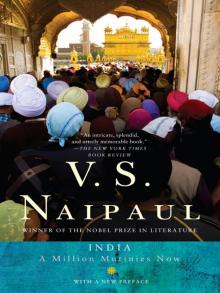 India: A Million Mutinies Now
India: A Million Mutinies Now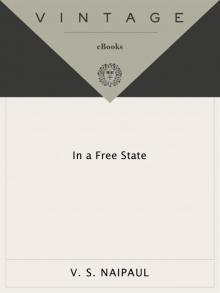 In a Free State
In a Free State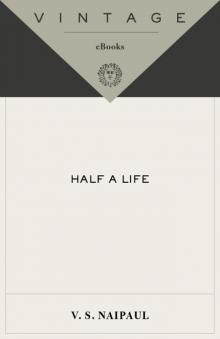 Half a Life
Half a Life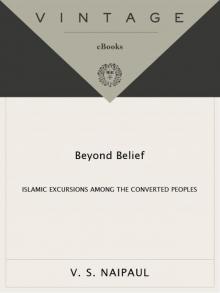 Beyond Belief: Islamic Excursions Among the Converted Peoples
Beyond Belief: Islamic Excursions Among the Converted Peoples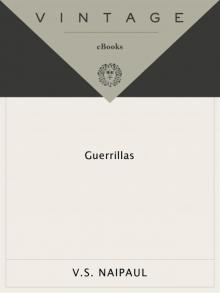 Guerrillas
Guerrillas A House for Mr. Biswas
A House for Mr. Biswas The Writer and the World: Essays
The Writer and the World: Essays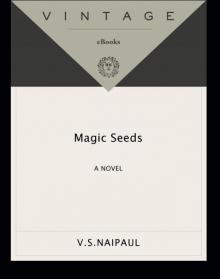 Magic Seeds
Magic Seeds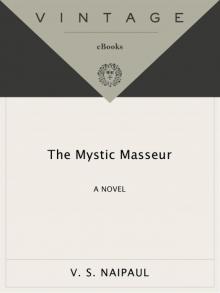 The Mystic Masseur
The Mystic Masseur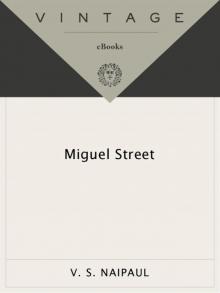 Miguel Street
Miguel Street The Return of Eva Perón, With the Killings in Trinidad
The Return of Eva Perón, With the Killings in Trinidad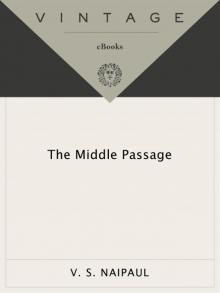 The Middle Passage
The Middle Passage A Bend in the River
A Bend in the River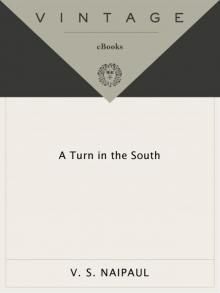 A Turn in the South (Vintage International)
A Turn in the South (Vintage International)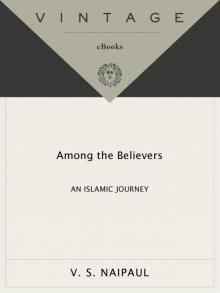 Among the Believers
Among the Believers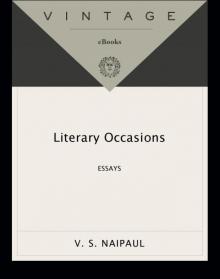 Literary Occasions
Literary Occasions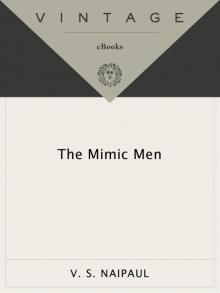 The Mimic Men
The Mimic Men The Writer and the World
The Writer and the World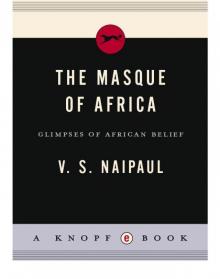 The Masque of Africa
The Masque of Africa